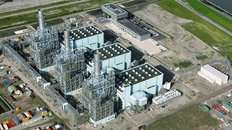- The MoU aims to convert Vattenfall’s Magnum gas power plant in the Netherlands to hydrogen, reducing CO2 emissions by 4 million tons annually.
- Feasibility studies will evaluate converting one of the three Magnum units to hydrogen and assess necessary infrastructure.
- The project includes designing a large-scale value chain for hydrogen production combined with CO2 capture, transport, and storage.
- Norwegian CO2 storage feasibility studies show potential for expanding storage capacity on the continental shelf.

Project Overview
Statoil, Vattenfall, and Gasunie have signed a Memorandum of Understanding (MoU) to explore converting Vattenfall’s Magnum gas power plant in the Netherlands into a hydrogen-powered facility. This conversion could potentially reduce CO2 emissions by 4 million tons annually, equivalent to the emissions from over 2 million cars.
Feasibility Studies
The next steps involve conducting feasibility studies to evaluate the conversion of one of the three Magnum units in Eemshaven to run on hydrogen. These units are operated by Vattenfall’s Dutch subsidiary. Gasunie will also assess the necessary infrastructure for hydrogen transport and storage.
Large-Scale Value Chain
The MoU's scope includes designing a large-scale value chain that combines hydrogen production with CO2 capture, transport, and permanent storage. This approach aims to create new business opportunities by overcoming high costs and the lack of CO2 storage facilities, which have previously hindered low-carbon hydrogen development.
CO2 Storage Potential
In 2016, the Norwegian government initiated a national CO2 capture, transport, and storage project. Studies confirmed the feasibility of storing CO2 on the Norwegian continental shelf, with high storage capacity and potential for expansion. If realized, this project could support CO2 storage for other initiatives, including the joint project by Vattenfall, Gasunie, and Statoil.
Future Prospects
Statoil has over 20 years of experience with CO2 storage on the Norwegian continental shelf. The company aims to help potential customers reduce their CO2 emissions on a large scale by introducing additional markets to the energy system, leveraging the economy-of-scale benefits from large-scale hydrogen production facilities.

